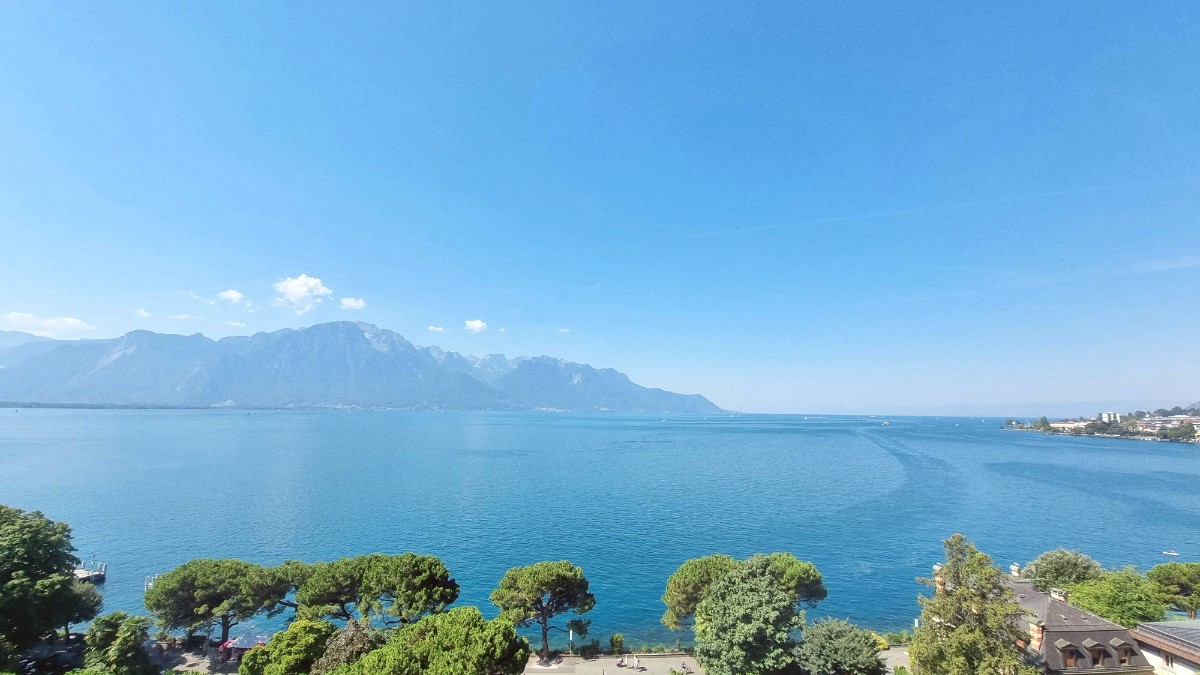
Lake Geneva Region, Switzerland
Spring (April-May): Temperatures typically range from 8°C to 18°C (46°F to 64°F). Montreux experiences moderate precipitation during these months. This season brings lush greenery and blooming flowers, making the lakeside promenade especially attractive. The air is fresh, and the crowds are smaller than in summer.
Summer (June-August): These are the warmest months. Temperatures range from 18°C to 28°C (64°F to 82°F). Precipitation is less frequent than in spring or autumn, with generally sunny days. Summer is ideal for lake activities like swimming and boating. The town buzzes with energy, especially during the Montreux Jazz Festival.
Hiking and Outdoor Activities: Late spring to early autumn (May-October) presents the most comfortable temperatures and open trails.
Lake Activities (swimming, boating): Summer (July-August) is the prime time for enjoying Lake Geneva's waters.
Warmest weather, lively festival time.
All attractions operate fully. Montreux Jazz Festival draws top artists and crowds.
Highest prices for accommodation and flights. Larger crowds at popular sites.
Pleasant temperatures, fewer crowds.
Lower prices for accommodation and flights. Beautiful spring blooms or striking autumn foliage.
Higher-altitude attractions may possess limited hours. Increased chance of rain.
Lowest prices for travel and lodging.
Minimal tourists, peaceful experience. Opportunities for winter sports in nearby mountains.
Colder weather, shorter daylight hours. Some attractions may close or have reduced hours.
Schengen Visa (Type C, short-stay): Citizens of many non-EU/EFTA countries need this visa for stays up to 90 days within any 180-day period. The application process typically involves applying through the Swiss embassy or consulate.
Citizens from countries like the United States, Canada, Australia, New Zealand, the United Kingdom, Japan, and many others do not need a Schengen visa for tourist stays up to 90 days within any 180-day period. A complete list exists on the Federal Office for Migration (SEM) website.
Valid for at least three months beyond departure, issued within 10 years.
Proof of departure from the Schengen Area.
Bank statements or credit card limits.
Hotel bookings or invitation letter.
Highly recommended for all travelers. For Schengen visa applicants, it is mandatory. Find options at World Nomads, SafetyWing, or Insubuy.
Switzerland is known for its high cost of living, and Montreux is no exception. Thoughtful budgeting helps manage expenses effectively.
The Swiss Franc (CHF) is the official currency. Denoted as Sfr or Fr. Check current exchange rates before travel.
Montreux presents options to manage your budget. Smart choices make your trip more economical.
| Travel Style | Accommodation (CHF) | Meals (CHF) | Transportation (CHF) | Attractions (CHF) | Total Daily Cost (CHF) |
|---|---|---|---|---|---|
| Budget | 30-60 | 30-50 | 10-20 | 10-20 | 80-150 |
| Mid-range | 80-150 | 50-100 | 20-40 | 20-50 | 150-300 |
| Luxury | 150-500+ | 100-200+ | 50-100+ | 50-100+ | 300+ |
Montreux and Switzerland maintain a very safe travel environment.
No specific vaccinations are mandatory for entry to Switzerland. Ensure your routine vaccinations are up-to-date.
This includes measles, mumps, rubella (MMR), diphtheria, tetanus, pertussis, polio, and influenza.
Consult a healthcare professional for personalized advice based on your medical history and travel plans.
Prevention is for a healthy trip.
Sunburn/Heatstroke: In summer, especially when hiking or by the lake, the sun intensifies. Use Sunscreen (SPF 30+), wear a hat, and stay hydrated.
Tick-borne diseases: Ticks appear in wooded and grassy areas. Check your body for ticks after outdoor activities. Consider Insect repellent on clothing and exposed skin.
Altitude Sickness: Only relevant for high-altitude excursions above 2,500 meters (8,200 feet). Montreux sits at a low altitude. If higher, ascend gradually and hydrate well.
Switzerland possesses a highly developed healthcare system. Hospitals, clinics, and pharmacies are readily available, staffed by well-trained professionals.
General Emergency: 112 (Europe-wide). Police: 117. Fire: 118. Ambulance: 144.
Pharmacies (Apotheke/Pharmacie) provide advice for minor ailments and dispense over-the-counter medications. Look for a green cross sign to identify them.
Switzerland maintains a very low crime rate. Montreux is generally a safe town. Violent crime is rare.
Travel insurance is highly recommended. A comprehensive policy protects against unforeseen events.
A policy should cover medical emergencies, emergency evacuation, trip cancellation or interruption, lost luggage, and personal liability. Compare policies from reputable providers.
Keep a list of emergency contacts easily accessible. Include family members, your insurance provider, and your embassy or consulate. Keep this list separate from your wallet.
Register with your country's embassy or consulate in Switzerland. For example, US citizens can use the Smart Traveler Enrollment Program (STEP). This helps your embassy locate you in an emergency.